|
|
|
Sort Order |
|
|
|
Items / Page
|
|
|
|
|
|
|
| Srl | Item |
| 1 |
ID:
179521
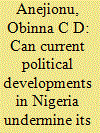

|
|
|
|
|
| Summary/Abstract |
Nigeria is currently embroiled in festering internal political crisis that could undermine its territorial integrity. The centripetal forces that have held the fragile union of various nationalities in Nigeria are waning, due to continuous political tensions orchestrated by unjust and unfair treatment of citizens, bolstered by ethnic and religious differences. The political tensions were tremendously heightened by the 2015 presidential election, which elicited fears that pointed to disastrous consequences. Three years after, the tensions are yet to abate, with increased calls for self-determination by different parts of the country. This provoked the need to investigate the political undercurrents that have persisted in the country, especially those experienced during the 2015 election, to understand how they may have shaped current events in Nigeria. The conceptual framework of this work was guided by the geopolitical theory of “politics of failure”. Connection of current events to Nigeria’s constitutional history was made, and the role it played in foisting a fragile foundation for the country was explored. Geospatial techniques were used to assess political dynamics in the country and their implication on the shrinking ligaments of Nigeria’s unity. This study found that the 2015 general election revealed a strongly divided country. Emerging political fault lines suggest that there is a strong potential of its eventual breakup. With the approaching general elections in 2019, there are indications the country might disintegrate in a violent way, if certain issues are not urgently addressed. Measures including extensive devolution of power, confederation, conduct of self-determination referendum and proportional representation were explored as possible panaceas to the problem.
|
|
|
|
|
|
|
|
|
|
|
|
|
|
|
|
| 2 |
ID:
132932
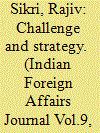

|
|
|
|
|
| Publication |
2014.
|
| Summary/Abstract |
For some time now, there has been a buzz about India's growing role in the world and a widespread feeling that India must play a much larger global role. Today, this feeling has become far more acute.
It is important, then, that there should be greater, and more widespread, awareness of foreign policy challenges faced by India, as well as a deeper understanding of the stakes and options for India's foreign policy. The public needs to be more knowledgeable about foreign affairs, which cannot be the concern only of those who exercise power in New Delhi. It is something in which every citizen should be involved. It is also essential that there should be a vibrant and constructive debate, especially involving the young, on where we are headed and why, because unless there is public support our foreign policy will not be successful. Some recent incidents pertaining to our relations with Sri Lanka and Bangladesh where the Chief Ministers of Tamil Nadu and West Bengal respectively forced the hand of the Central Government illustrate this point. I am glad that the BJP manifesto talks about having a "Team India" that brings together the Prime Minister and the Chief Ministers of States.
My conversation with you today is a small effort to create this awareness, perhaps stimulate your imagination and set you thinking.
|
|
|
|
|
|
|
|
|
|
|
|
|
|
|
|
| 3 |
ID:
120514
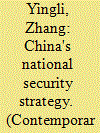

|
|
|
|
|
| Publication |
2013.
|
| Summary/Abstract |
China has set four goals in its national security strategy in the coming decade. These are focused on safeguarding 1) sovereignty, security and territorial integrity; 2) the socialist system and related core values; 3) development interests by sustaining the current period of strategic opportunity in avoidance of unnecessary distractions; and finally 4) regional and world peace.
|
|
|
|
|
|
|
|
|
|
|
|
|
|
|
|
| 4 |
ID:
133977
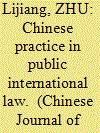

|
|
|
|
|
| Publication |
2014.
|
| Summary/Abstract |
This Survey covers materials reflecting Chinese practice in 2013 relating to: Fundamental Principles of International Law (The Principle of Equality of State Sovereignty; Permanent Sovereignty over Natural Resources; Prohibition of Threat or Use of Force; Peaceful Settlement of International Disputes; Non-intervention in Internal Affairs); Sources of International Law (Identification of Customary International Law; Guide to Practice on Reservations to Treaties; Provisional Application of Treaties); Relationship between International Law and Chinese Law (Act on Administration of Tax Collection Revised; Act on the Prevention and Control of Environmental Pollution by Solid Wastes Revised; Act on Seed Revised; Act on Animal Epidemic Prevention Revised; Act on Trade Mark Revised; Act on Fishery Revised; Act on Marine Environment Protection Revised; Act on Customs Revised); Recognition of New States (Palestine; Kosovo); Jurisdiction and Immunity (Scope and Application of Universal Jurisdiction; Immunity of State Officials from Foreign Criminal Jurisdiction); China's Territorial Integrity (Taiwan; Tibet; China-India Border; Diaoyu Island and its Affiliated Islands; Nansha Islands); Polar Regions (Arctic Council; Antarctic Treaty); International Law of the Sea (Submission to the Commission on the Limits of the Continental Shelf in part of the East China Sea; Commission on the Limits of the Continental Shelf (CLCS); International Seabed Authority (ISA); International Tribunal for the Law of the Sea (ITLOS); Marine Biodiversity beyond Areas of National Jurisdiction; Reorganization of State Ocean Administration); International Air and Space Law (Establishment of Air Defense Identification Zone in East China Sea; Peaceful Use of Outer Space; Transparency and Confidence-Building Measures in Outer Space; International Code of Conduct for Outer Space Activities); International Cyberspace Law (International Code of Conduct for Information Security; Cyber Crime); Aliens (Regulation on Administration of Exit and Entry); International Human Rights Law (Universal Periodic Review; Office of the High Commissioner for Human Rights (OHCHR); International Covenant on Civil and Political Rights (ICCPR); Convention against Torture and Other Cruel Inhuman or Degrading Treatment or Punishment (CAT); Convention on the Rights of the Child (CRC); Human Rights Treaty Bodies and Their Reform; Rights of Indigenous Peoples; Action Plan for Fighting Human Trafficking (2013-2020)); International Humanitarian Law (Protection of Civilians in Armed Conflicts; Protection of Journalists in Armed Conflicts); International Law on Disasters (Protection of Persons in the Event of Disasters); International Law on Arms Control, Disarmament and Non-proliferation (Nuclear Disarmament and Non-Proliferation; Chemical Weapons Convention; Biological Weapons Convention (BWC); Convention on Certain Conventional Weapons (CCW); Amended Protocol II to the CCW; Ottawa Convention; Convention on Cluster Munitions (CCM); Protocol V to the CCW (ERW); Improvised Explosive Devices (IEDs); Lethal Autonomous Robots; Arms Trade Treaty (ATT); Small Arms and Light Weapons; Conference on Disarmament (CD)); International Criminal Law (Crimes against Humanity; International Criminal Court (ICC); ICTY and ICTR; UN Comprehensive Convention against Terrorism; Agreement on the Procedure for Organizing and Conducting Joint Anti-Terrorist Exercises by Member States of the Shanghai Cooperation Organization; Agreement on the Procedure for Organizing and Conducting Joint Anti-Terrorist Operations within Member States of the Shanghai Cooperation Organization; Trafficking in Cultural Property; Ratification of the Treaty on Transfer of the Convicted between the People's Republic of China and the Republic of Kyrgyzstan; International Criminal Judicial Assistance and Police Cooperation); International Environmental Law (Climate Change; Sustainable Development; Protection of Atmosphere; Action Plan on Air Pollutio
|
|
|
|
|
|
|
|
|
|
|
|
|
|
|
|
| 5 |
ID:
132928
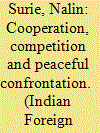

|
|
|
|
|
| Publication |
2014.
|
| Summary/Abstract |
The India?China relationship is already not a zero sum game. The potential for collaboration to mutual benefit though is much greater whether from the perspective of learning from each other's socio economic programs and successes, for bilateral economic relations or cooperation in regional and international programs. However, for this to be realised in greater and greater measure will require the development of much greater mutual trust and a mindset change, especially in our largest neighbour
|
|
|
|
|
|
|
|
|
|
|
|
|
|
|
|
| 6 |
ID:
131167


|
|
|
| 7 |
ID:
134091
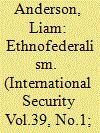

|
|
|
|
|
| Publication |
2014.
|
| Summary/Abstract |
Scholars are divided on the merits of ethnofederalism as an institutional approach to the management of ethnically divided societies. For some, ethnofederalism is a potentially workable compromise between the demands for independence of territorially concentrated ethnic groups and the desire of a common state to preserve its territorial integrity; for critics, it is a short-cut to secession and ultimate state collapse. The argument of critics is theoretically plausible, but an examination of the universe of post-1945 states with ethnofederal arrangements, both failures and successes, shows that ethnofederalism has succeeded more often than it has failed. Within this universe of cases, moreover, ethnofederalism has demonstrably outperformed institutional alternatives, and where ethnofederal systems have failed, they have failed where no institutional alternatives could plausibly have succeeded. The increasing enthusiasm among policymakers and practitioners for prescribing federal solutions to ethnic problems is both understandable and defensible in light of these findings.
|
|
|
|
|
|
|
|
|
|
|
|
|
|
|
|
| 8 |
ID:
131357
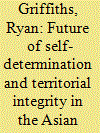

|
|
|
|
|
| Publication |
2014.
|
| Summary/Abstract |
The twentieth century saw the rise of two important and interrelated norms. The first is the norm of self-determination, which advances the right of stateless nations to govern themselves. The second is the norm of territorial integrity, which upholds the principle that political borders should be respected. A consequence of these norms has been an increase in secessionism, a decline in conquest, and a proliferation of states. This paper will examine the development of these norms, their interrelationship, and their prospects for the future. Attention will be given to three important questions: (1) Under what conditions does a norm endure beyond a power transition? (2) How likely is an ascendant China or India to support the norms? (3) What does a power transition and the corresponding support of these norms augur for the future of secession, conquest, and the number of sovereign states?
|
|
|
|
|
|
|
|
|
|
|
|
|
|
|
|
| 9 |
ID:
123401
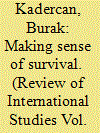

|
|
|
|
|
| Publication |
2013.
|
| Summary/Abstract |
The assumption that 'states' primary goal is survival' lies at the heart of the neorealist paradigm. A careful examination of the assumption, however, reveals that neorealists draw upon a number of distinct interpretations of the 'survival assumption' that are then treated as if they are the same, pointing towards conceptual problems that surround the treatment of state preferences. This article offers a specification that focuses on two questions that highlight the role and function of the survival assumption in the neorealist logic: (i) what do states have to lose if they fail to adopt self-help strategies?; and (ii) how does concern for relevant losses motivate state behaviour and affect international outcomes? Answering these questions through the exploration of governing elites' sensitivity towards regime stability and territorial integrity of the state, in turn, addresses the aforementioned conceptual problems. This specification has further implications for the debates among defensive and offensive realists, potential extensions of the neorealist logic beyond the Westphalian states, and the relationship between neorealist theory and policy analysis.
|
|
|
|
|
|
|
|
|
|
|
|
|
|
|
|
| 10 |
ID:
122983
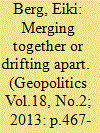

|
|
|
|
|
| Publication |
2013.
|
| Summary/Abstract |
One way to approach conflict management is to use a four-dimensional political legitimacy criterion, which could set the agenda for enhancing peace prospects in Cyprus, Moldova and Bosnia and Herzegovina (BiH). Here the argument is that through measuring the internal legitimacy of conflicting parties and then comparing and contrasting the given empirical values on the scales of cohesion/security and democracy/performance, we may be able to distinguish conflicting pairs either "merging together" or "drifting apart", depending on how the secessionist entities position themselves vis-à-vis their parent states. Empirical facts on the ground tell us that Cyprus may have the biggest chances of reunification, whereas Moldova's perspective looks meagre. The BiH, which has preserved its territorial integrity, faces real secessionist challenges, given the illegitimacy of the state and a manifest dissatisfaction with systemic deficiencies.
|
|
|
|
|
|
|
|
|
|
|
|
|
|
|
|
| 11 |
ID:
095123
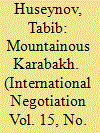

|
|
|
|
|
| Publication |
2010.
|
| Summary/Abstract |
This article analyzes the Karabakh conflict's peace process and suggests a set of approaches to guide future progress. Proceeding from an interest-based framework, the research examines ways to reconcile the power, rights and interests of the conflicting parties. It is argued that a serious shift in the approaches and policies of both the conflicting parties and also the mediators is needed to achieve a breakthrough in the talks. In broader and long-term perspective, stable and sustainable conflict resolution requires the establishment of a power-sharing arrangement that would be based on equal and horizontal relationships between Armenians and Azeris at both sub-national (Mountainous Karabakh), and national (Azerbaijan) levels, and combines this power-sharing arrangement with regional integration.
|
|
|
|
|
|
|
|
|
|
|
|
|
|
|
|
| 12 |
ID:
151161
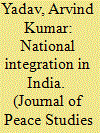

|
|
|
| 13 |
ID:
139291
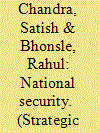

|
|
|
|
|
| Summary/Abstract |
The concept of national security has often been taken to merely connote the preservation of sovereignty, territorial integrity and internal stability with the focus on the coercive power of the state. In today’s complex and interdependent world faced with many non traditional threats like pandemics, climate change, etc it must, however, be seen in a more holistic manner. Such an all encompassing view of national security demands that the determinant of security is not just the coercive elements of state power but its comprehensive national power with the latter being a composite of many factors across all facets of national life. These factors, inclusive of leadership, if quantified, can help develop a national security index which in comparative terms could serve as an indicator of the relative security of a country vis a vis its peers. The holistic nature of national security demands that appropriate structures are in place to manage it. India is fortunate to have such structures which, of course, need revitalisation.
|
|
|
|
|
|
|
|
|
|
|
|
|
|
|
|
| 14 |
ID:
184935
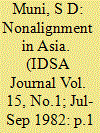

|
|
|
| 15 |
ID:
121667
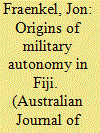

|
|
|
|
|
| Publication |
2013.
|
| Summary/Abstract |
Alongside Thailand and Pakistan, Fiji has gained a reputation as the most coup-prone state in the Asia-Pacific region. Following a succession of coups, Fiji's military eventually established a longer-term authoritarian administration, inviting comparisons with Burma and Indonesia under Suharto, where military rulers also saw themselves as playing an overarching guardian role transcending ethnic cleavages. Yet, unlike Burma and Indonesia, Fiji's military has no heroic history of involvement in a national liberation struggle and faces no serious threat to territorial integrity. This article examines the dynamics of Fiji's three coups and the accompanying shifts in military orientation. During the initial coups, the military served principally as an instrument of the country's ethnic Fijian chiefly elite. Since the third coup, in December 2006, it has not only confronted key institutions of Fijian power, including the Great Council of Chiefs and the Methodist Church, but also dismantled core bases of Fiji Indian politics, including sugar cane farmers' organisations and municipal councils. International focus on the electoral timetable has distracted attention from these deeper-seated changes. Fiji has reached the end of a long era of bicommunal ethnic politics, with schisms amongst indigenous Fijian factions likely to dominate the country's politics in the future.
|
|
|
|
|
|
|
|
|
|
|
|
|
|
|
|
| 16 |
ID:
133035
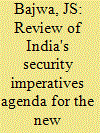

|
|
|
|
|
| Publication |
2014.
|
| Summary/Abstract |
The armed forces of a country are a manifestation of the Government's commitment to the people it represents of its concern for the pursuing the country's national interests, for providing people security and creating a safe environment for the people to achieve individual success and growth. The armed forces require constant nurturing and involvement of the executive authority. Well-trained and modernised armed forces cannot be bought off the shelf. The issues enumerated here are not a vague notional wishlist but fundamentals that impact various facets of security and the related modernisation of the Army. It is the right of every citizen to demand of the Government to ensure the territorial integrity of the nation and a peaceful internal environment for the well being of the people. The armed forces pay back fully in sweat and blood.
|
|
|
|
|
|
|
|
|
|
|
|
|
|
|
|
| 17 |
ID:
127424
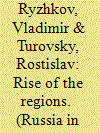

|
|
|
|
|
| Publication |
2013.
|
| Summary/Abstract |
The regions are hindering Russian progress by their loss of initiative, interest in independent development, parasitism, betting on shadow lobbying, and fear of sanctions by the center. Excessive centralization results in numerous and inevitable administrative errors.
|
|
|
|
|
|
|
|
|
|
|
|
|
|
|
|
| 18 |
ID:
130874


|
|
|
|
|
| Publication |
2014.
|
| Summary/Abstract |
Maritime security in the Indian Ocean Region (IOR) has become a paramount consideration; a range of traditional and non-traditional security challenges largely converge at sea. Risk-based processes offer the potential to engage in a positive, constructive and non-confrontational approach that will help to identify collective and cooperative security strategies. Analysing the evolving maritime security risk context provides a powerful tool for understanding common risks and vulnerabilities that affect regional and extra-regional actors with interests in the IOR. This can provide the impetus for diverse actors, primarily states, to cooperate to advance common objectives and protect shared interests without significantly compromising territorial integrity or sovereignty, against a range of risks that no single actor has the ability to mitigate. Commissioning a multinational, multi-disciplinary team of experts to conduct a regional strategic risk assessment, with a specific focus upon maritime security, should be a priority. Maritime security cooperation in the IOR could, if managed astutely and prudently, bind a diverse and largely disaggregated region
|
|
|
|
|
|
|
|
|
|
|
|
|
|
|
|
| 19 |
ID:
118725
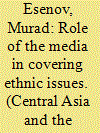

|
|
|
|
|
| Publication |
2012.
|
| Summary/Abstract |
Ethnic conflicts are one of the most problematical and sensitive issues known to the world today. Since World War II, for example, more than 100 armed conflicts have broken out in different parts of the world, most of which are ethnic in nature. These conflicts pose a threat to state security and territorial integrity and, in their extreme form, are accompanied by violence, bloodshed, mass violations of human rights, huge numbers of refugees, significant material losses, and so on.
|
|
|
|
|
|
|
|
|
|
|
|
|
|
|
|
| 20 |
ID:
189140
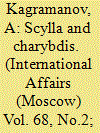

|
|
|
|
|
| Summary/Abstract |
LIKE Odysseus, who fell into the clutches of Scylla after escaping the whirlpool Charybdis, countries that have escaped the threat of losing territory as a result of foreign invasion are facing the threat of disintegration from within. The ancient epic by the great Homer about the adventures of the hero Odysseus, who finds himself between a rock and a hard place, involuntarily comes to mind when considering the perennial international legal dilemma about the relationship between the principle of the territorial integrity of states and the right of peoples and nations to self-determination.
|
|
|
|
|
|
|
|
|
|
|
|
|
|
|
|
|
|
|
|
|